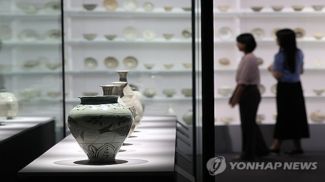BEIJING, 22 April (BelTA - China Daily). - Poet Su Shi (1037-1101), also known as Su Dongpo, of the Song Dynasty (960-1279), is one of the most recognized Chinese cultural icons of all time. His legacy, including his calligraphy, painting and his broad influence in lots of fields, as well as his poetry, is celebrated even today.
A musical, Su Dongpo, based on Su's lifetime story will premiere at Beijing's Tianqiao Performing Arts Center on May 4 and will run until May 8.
Songwriter Shen Qing composed nine songs with lyrics adapted from Su's famous ci poems, including The Mid-Autumn Festival (to the tune of "Prelude to Water Melody") and Memories of the Past at Red Cliff (to the tune of "Charm of a Maiden Singer"). Ci poetry is a specific type of rhythmic, tonal delivery popular during the Song Dynasty.
"If he lived today, Su Shi would be a great film director," says Shen, who rose to fame by writing pop songs during the 1990s, making a name with his catchy, soothing ballads. "From his poetry, I can see pictures full of emotion that leave enough space for people to imagine."
The musical tells the story of Su, born in Meishan, now in modern-day Sichuan province, from his youth to his last days in Changzhou, Jiangsu province.
At the age of 20, Su performed brilliantly in the imperial examinations, and began a long and distinguished career as an official, working in various governmental positions. He went through a series of political setbacks, however, including appointments to minor posts in distant places. In spite of the hardships, though, he still retained his optimism.
The musical also portrays the relationship between Su and his family, especially his father Su Xun and his younger brother Su Zhe, both, like him, accomplished men of letters. Su Shi's love for his wife, Wang Fu, is another highlight of the musical.
"As children, we learned and recited Su Shi's poems," says tenor Li Xiang, who plays the role of Su Shi in the musical. "He is a household name in China and it is difficult to describe him in a few words. He was more than a poet." Along with the creative team of the musical, Li started preparing for the role over a year ago by visiting scholars and repeatedly reading Su Shi's works.
"As well as his talent and versatility, I also admire his optimism, given that his career path was bumpy," adds Li, who graduated from the Central Conservatory of Music in Beijing and has been performing as a tenor with the China National Opera House since 2005.
Li also invited his friend, Peking Opera actress Suo Mingfang, to play the role of Wang, Su Shi's wife. At 16, she married Su Shi, when he was 19. They had a happy marriage until Wang died 11 years later.
Su Shi was heartbroken. Ten years after Wang's death, he still couldn't forget her and composed a ci poem after dreaming of his wife. Dreaming of My Deceased Wife (to the tune of "A Riverside Town") remains one of his most well-known works. In it, he wrote: "For 10 years, the living of the dead knows nought. Though to my mind not brought, could the dead be forgot?"
The poem touched the actress so much that the adapted song turned out to be her favorite in the musical.
She says: "Su Shi used just a few words to express his sorrow, but it's so romantic!"
"I was trained to be a Peking Opera actress since I was a child. Singing a Peking Opera piece is totally different from singing a pop song," Suo says. "The role of Wang Fu requires me to combine two different singing styles."
Peking Opera, or jingju, has a history of more than 200 years and was recognized as an Intangible Cultural Heritage of Humanity by UNESCO in 2010. It brings together art forms such as singing, dancing, martial arts and acrobatics.
As a veteran with the Jingju Theater Company of Beijing, this is her first musical, and she explains that it has been "very challenging".
According to producer Li Hui, the idea of making Su Dongpo started more than a year ago, after the team finished creating the musical, Youngster Guo Moruo (Shaonian Guo Moruo), which premiered last September.
Youngster Guo Moruo was the first musical production Li Hui and Shen developed together, hoping to inspire the younger generation with the stories of Guo (1892-1978), a leading figure in Chinese intellectual history who made enormous contributions to Chinese literature, archaeology, art and translation, among other areas.
Like Shen, Li Hui also spent decades working in the country's pop music scene, organizing outdoor music festivals and running record companies, such as Jingwen Records, one of the largest record companies in China.
Li Hui admits that, when it comes to musicals, the genre is fairly new to them. "But, we know music, especially about creating a catchy tune," says Li Hui.
"The feedback of Youngster Guo Moruo was good, which inspired us to create a second musical."













